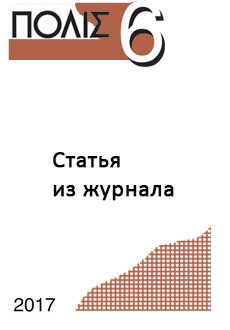Online shop of "Polis. Political Studies" Journal
We in the world, the world in us
Strezhneva M.V. Methodological Aspects in the Study of Foreign Policy and Global Role of the European Union. – Polis. Political Studies. 2017. No 6. P. 25-42
150 руб.
Methods of research, informed by theories of international relations, frequently employed when studying foreign policy and global role of the European Union, are analytically discussed in this article for the sake of methodologic reflection. Such key concepts as statehood, subjectivity, system, identity, norms and differentiation, are used as reference points to “navigate” between separate theories in order to compare them, thus achieving a clearer description of conceptual ambiguity of respective terms, with certain consequences as concerns direction, limits and scope of any theoretically-oriented analysis. The article shows that IR theories are actively developing and provide good assistance to researchers in exploring international behavior and possible results of the EU’s global influence. The choice the author makes in favour of a certain methodology cannot be taken as neutral: it influences the ways they are interpreted. Thus, better self-reflection is important for credibility of the findings. Ambivalence of the EU as an object of political study is a particular challenge for the IR theories, pushing on their evolution and consolidation of the analytical methods they use. The article presents additional options, provided in this respect by introducing methods employed in political economy and sociology. The notion of the normative power of Europe, introduced and developed by Ian Manners, is singled out as the most popular concept in the area of study under consideration, attracting in impressive numbers the attention of European specialists with differing theoretical predilections. It was found that, when basing exclusively on the constructivist theory as proposed by Alexander Wendt, this notion loses robustness as an instrument of research: rather than helping to understand the specifics of the EU’s international behavior, it prescribes to the EU a certain quite aggressive conduct on the presumption of the indisputable superiority of the European norms for the future European and wider (global) order.
 English
English Русский
Русский

Reviews
There are no reviews yet.